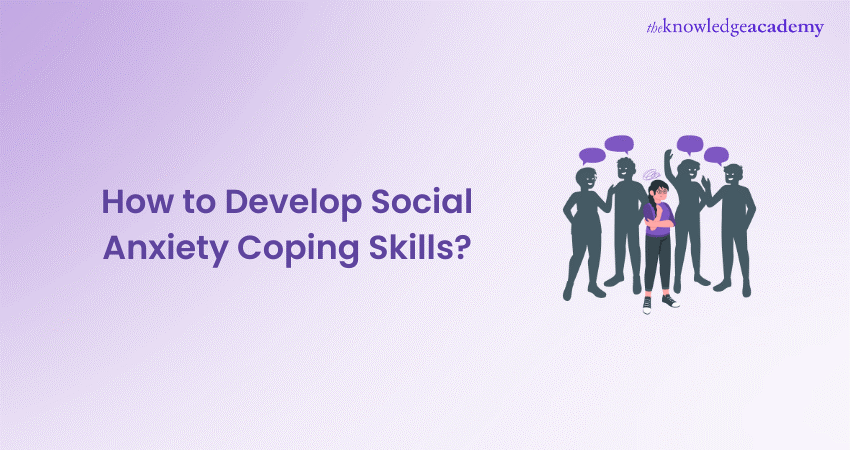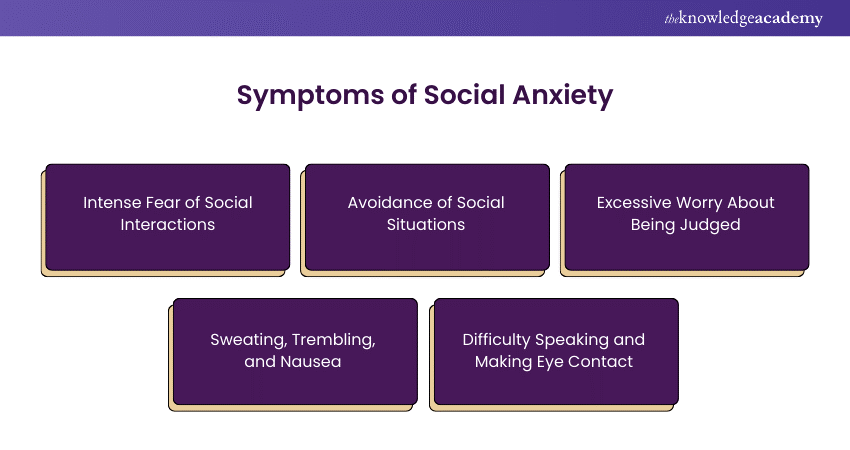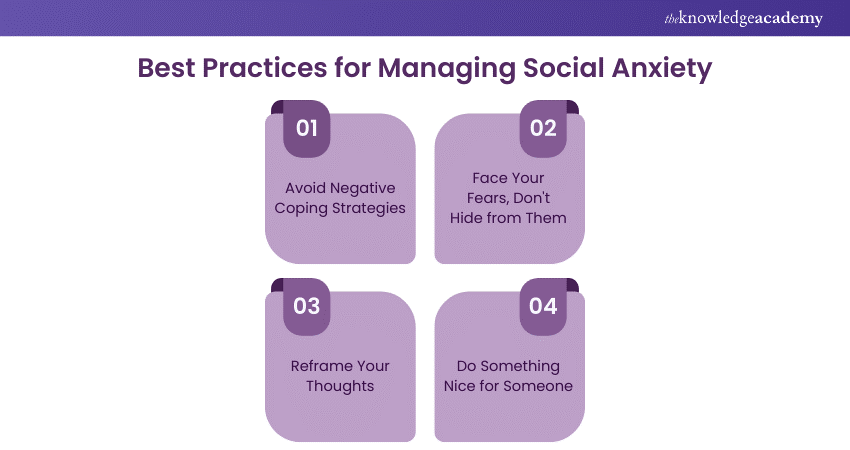We may not have the course you’re looking for. If you enquire or give us a call on 0800 446148 and speak to our training experts, we may still be able to help with your training requirements.
Training Outcomes Within Your Budget!
We ensure quality, budget-alignment, and timely delivery by our expert instructors.

Imagine stepping into a room full of people and feeling a wave of calm rather than a storm of fear. Social anxiety can be daunting and is a part of personal and professional lives across the world. According to recent estimates, around four percent of the global population suffers from anxiety disorders. That makes it one of the most common mental health issues in the world.
But with the right coping skills, you can transform those nerve-wracking moments into opportunities for growth and connection. This blog explores practical techniques to help you build confidence, ease anxiety, and navigate social situations with assurance, confidence and clarity.
Table of Contents
1) What is social anxiety?
2) Signs of Social Anxiety Disorder
3) Increasing Social Skills to Decrease Anxiety
4) Four Best Practices for Managing Social Anxiety
5) Challenge Your Negative Thoughts
6) How to Help a Friend with Social Anxiety
7) Conclusion
What is Social Anxiety?
Social anxiety is the fear of being evaluated or judged negatively in social situations. This leads to feelings of inadequacy, self-consciousness, inferiority or embarrassment. The person feels compelled to avoid every social situation and can affect daily activities such as shopping or office work.
People with social anxiety disorder can feel significant emotional distress in the situations listed below:
a) Being the centre of attention
b) Being introduced to other people
c) Being watched at work
d) Meeting people in positions of authority
e) Social encounters involving strangers
f) Expressing opinion either in front of a crowd or in interviews
g) Interpersonal relationships ranging from friendships to romantic
Signs of Social Anxiety Disorder
Recognizing the signs of social anxiety disorder is the first step toward seeking help. Here are some of the most common symptoms:

1) Intense Fear of Social Interactions
Individuals with social anxiety can experience overwhelming fear in social settings, by worrying about negative response from others and feelings of embarrassment. This fear can be so intense that it disrupts daily activities and relationships.
2) Avoidance of Social Situations
To manage their anxiety, people may avoid social gatherings, meetings, or any situation where they might interact with others. But this avoidance can lead to isolation and negatively impact their personal and professional lives.
3) Excessive Worry About Being Judged
Individuals with social anxiety frequently worry about being judged or scrutinised by others. This concern can persist before, during, and after social interactions, leading to heightened stress and self-consciousness.
4) Physical Symptoms Like Sweating, Trembling, and Nausea
Social anxiety can manifest physically, with symptoms such as excessive sweating, trembling, rapid heartbeat, nausea and dizziness. Additional physical symptoms of social anxiety may include upset stomach and a rigid body stance or muscle tension. These physical reactions can further increase the individual's anxiety and discomfort in social settings.
5) Difficulty Speaking and Making Eye Contact
People with social anxiety can struggle to speak clearly or maintain eye contact. They might feel their voice shaking or their mind going blank, making it challenging to engage in conversations and connect with others.
Identifying these signs can help individuals understand their experiences and seek appropriate treatment or coping techniques.
Are you a manager looking to reduce workplace stress in your company? Consider our Work Place Stress and Mental Health Identification for Manager Course. Sign up now!
Increasing Social Skills to Decrease Anxiety
Enhancing social skills is an effective way to reduce social anxiety. Improved social interactions can boost confidence and lessen anxiety over time. Here are some skills to consider:
1) Assertiveness Skills
Assertiveness is the ability to express one’s thoughts, feelings and needs confidently and respectfully. Key assertiveness skills include the following:
a) Using “I” statements to express feelings (e.g., “I feel uncomfortable when…”)
b) Setting and respecting personal boundaries
c) Practicing saying “no” to unreasonable requests
d) Seeking and responding to constructive feedback
2) Nonverbal Communication Skills
Nonverbal cues play a significant role in social interactions. Improving nonverbal communication can enhance how one is perceived by others. Important aspects include:
a) Maintaining appropriate eye contact
b) Adopting open and relaxed body language
c) Smiling genuinely
d) Observing and mirroring others’ nonverbal cues
3) Verbal Communication Skills
Effective verbal communication is crucial for reducing social anxiety. Key strategies include:
a) Practicing active listening by summarising and reflecting on what others say
b) Using a calm and steady tone of voice
c) Building a diverse vocabulary to express oneself clearly
d) Engaging in small talk to build conversational confidence
Looking to turn your workplace into a psychologically uplifting and vibrant environment?
Sign up for our Psychology of Behaviour at Work Training now!
4) Practice Deep Breathing
Social anxiety involves strong emotional reactions in social situations. This results in rapid breathing which in turn makes other symptoms worse. One way to reduce these anxious reactions is to practice deep breathing. Consider the following steps:
a) Keep a count of the number of breaths taken in one minute (An inhale and exhale count as one). On average, a person takes 10 to 12 breaths every minute.
b) Focus taking deep breaths from the diaphragm instead of shallow breathing from the chest. Inhale and exhale for 4 seconds each (You can use a watch with a second hand). While exhaling, think “relax” and continue breathing this way for at least 5 minutes.
c) Count the breaths per minute again and check if the number has gone down.
d) Practice this breathing technique few times a day even if you are already relaxed. It may help to start practicing right after waking up and right before going to sleep.
Besides these coping strategies, you can focus on activities or hobbies that ignite your passion.
Get regular exercise, opt for healthy food, and avoid caffeine and sugar. This will go a long way to naturally reduce your anxiety.
Bonus tip: Did you know that there are specific foods that can reduce anxiety? If not, consider that remedied! Herbal tea, Dark Chocolate, Citrus fruits and Avocados are proven to have a calming effect on an anxious mind.
Four Best Practices for Managing Social Anxiety
Developing coping skills involves adopting best practices that address the core aspects of social anxiety. Here are four effective strategies:

1) Avoid Negative Coping Strategies
Avoiding negative coping mechanisms like substance abuse, avoidance, or procrastination is vital. These behaviours can exacerbate anxiety and hinder progress. Instead, focus on healthy habits and constructive coping strategies.
2) Face Your Fears, Don't Hide from Them
Avoidance reinforces social anxiety. Gradual exposure to feared situations can help desensitise and reduce anxiety over time. Start with less intimidating scenarios and progressively tackle more challenging ones.
3) Reframe Your Thoughts
Cognitive restructuring includes identifying and challenging negative thoughts, replacing them with more balanced perspectives. Techniques include:
a) Recognising cognitive distortions
b) Practicing positive affirmations
c) Keeping a thought journal
d) Reflecting on past social successes
4) Do Something Nice for Someone
Acts of kindness shift focus from oneself to others, reducing self-consciousness and anxiety. Volunteering, helping a friend, or offering a compliment can improve mood and foster social connections.
Enhance your empathetic and effective communication skills with our Mental Health Courses
Challenge Your Negative Thoughts
Social anxiety can result in misinterpretation of comments or facial expressions made by others. This can contribute to the associated emotional reactions. Consider these steps to reduce negative thoughts:
a) Think of the most recent social situation that caused your feelings of anxiety. Write down the negative thoughts that occurred before, during or after the situation.
b) Now ask questions to challenge these negative thoughts. For example, if the automatic thought was, "People are looking at their watch, I must be boring them," look for an alternate explanation. An alternative thought could be that they were just late for some personal engagement.
c) Just like that, try to notice automatic negative thoughts that you experienced before, during, and after such social situations, and challenge them with alternatives.
How to Help a Friend with Social Anxiety?
Supporting a friend with social anxiety requires empathy, patience, and understanding. Effective ways to provide help include:
a) Encouraging them to seek professional help if needed
b) Being a good listener and validating their feelings
c) Offering to accompany them to social events
d) Avoiding pressuring them into uncomfortable situations
e) Sharing resources and coping strategies
Over time, practicing these coping strategies will ensure smooth handling of anxiety during stressful situations. But if you are still facing severe anxiety, you should consult a medical care provider or mental health professional.
While it can be tempting to think that you can solve this all on your own, don't wait too long to seek professional help.
Also Read: How to Reduce Anxiety Immediately
Conclusion
In conclusion, mastering Social Anxiety Coping Skills can transform lives. By understanding social anxiety, recognising its signs, and employing effective strategies individuals can overcome their fears and build fulfilling social connections. We hope this blog inspires and empowers you on your journey to defeating social anxiety.
Improve your anxiety coping skills through Anxiety Courses - Sign up now!
Frequently Asked Questions

Every social anxiety trigger centers around socialising whether the individual is just thinking about it or actually taking part in it. These triggers include:
a) Parties or family events.
b) Having to talk to people.
c) Crowded workplace.
d) Making phone calls.

Avoid negative coping mechanisms like substance abuse or procrastination. Healthy diet, regular physical exercise and mediation can help reduce anxiety in the long term.

The Knowledge Academy takes global learning to new heights, offering over 30,000 online courses across 490+ locations in 220 countries. This expansive reach ensures accessibility and convenience for learners worldwide.
Alongside our diverse Online Course Catalogue, encompassing 17 major categories, we go the extra mile by providing a plethora of free educational Online Resources like News updates, Blogs, videos, webinars, and interview questions. Tailoring learning experiences further, professionals can maximise value with customisable Course Bundles of TKA.

The Knowledge Academy’s Knowledge Pass, a prepaid voucher, adds another layer of flexibility, allowing course bookings over a 12-month period. Join us on a journey where education knows no bounds.

The Knowledge Academy offers various courses on Mental Health, including Handle Anxiety Masterclass Course and Mindfulness Training. These courses cater to different skill levels, providing comprehensive insights into Anxiety Management.
Our Health & Safety Resources cover a range of topics related to Anxiety, offering valuable resources, best practices, and industry insights. If you are looking for guidance on Anxiety Management, The Knowledge Academy's diverse courses and informative blogs have got you covered.







 Top Rated Course
Top Rated Course




 If you wish to make any changes to your course, please
If you wish to make any changes to your course, please


